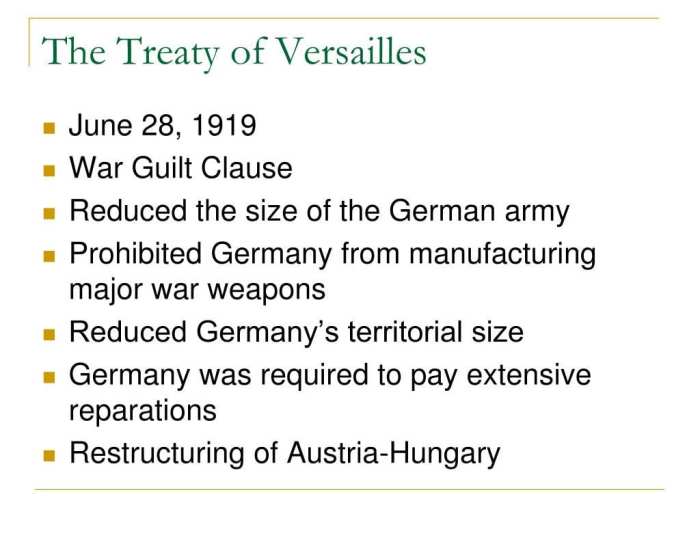The Treaty of Versailles Worksheet Answer Key is an invaluable resource for students seeking a thorough understanding of this pivotal document. This guide provides a comprehensive overview of the treaty’s historical context, key provisions, reactions, and long-term consequences, ensuring a comprehensive grasp of its significance in shaping the 20th century.
The treaty, signed in 1919, marked the end of World War I and imposed harsh penalties on Germany, including reparations, territorial losses, and disarmament. These provisions had a profound impact on Germany’s political, economic, and social landscape, contributing to widespread resentment and ultimately the outbreak of World War II.
Historical Context

The Treaty of Versailles was a peace treaty that ended World War I. The treaty was signed on June 28, 1919, in the Hall of Mirrors at the Palace of Versailles in France. The treaty was negotiated between the Allied Powers (primarily France, Great Britain, Italy, and the United States) and Germany.
Key Provisions of the Treaty

- Reparations: Germany was required to pay reparations to the Allied Powers in the amount of 132 billion gold marks (approximately $33 billion at the time). The reparations were to be paid over a period of 30 years.
- Territorial changes: Germany lost territory to France, Belgium, Denmark, and Poland. Germany also lost all of its overseas colonies.
- Disarmament: Germany was limited to a small army and navy. Germany was also prohibited from producing or possessing certain types of weapons.
Reactions to the Treaty
The Treaty of Versailles was met with mixed reactions. The Allied Powers were generally satisfied with the treaty, as it punished Germany for its role in starting World War I. However, Germany was very unhappy with the treaty, as it felt that the treaty was too harsh and that it placed too much blame on Germany for the war.
Long-Term Consequences: The Treaty Of Versailles Worksheet Answer Key
The Treaty of Versailles had a number of long-term consequences. The treaty contributed to the rise of Adolf Hitler and the Nazi Party in Germany. The treaty also helped to create the conditions that led to the outbreak of World War II.
Questions and Answers
What was the significance of the Treaty of Versailles?
The Treaty of Versailles ended World War I and imposed harsh penalties on Germany, contributing to widespread resentment and ultimately the outbreak of World War II.
What were the key provisions of the treaty?
The treaty included provisions for reparations, territorial changes, and disarmament, which had a profound impact on Germany.
What were the reactions to the treaty?
The treaty was met with widespread dissatisfaction, particularly in Germany, where it was seen as excessively punitive.
What were the long-term consequences of the treaty?
The treaty contributed to the rise of nationalism and extremism in Germany, ultimately leading to the outbreak of World War II.